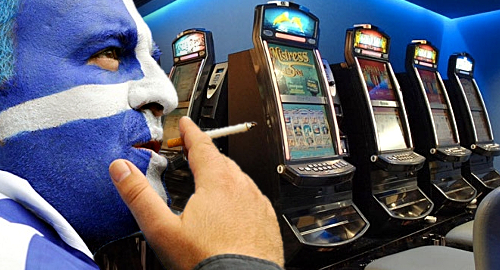 Greece’s casino market underwent a significant decline in the final quarter of 2019 thanks to new smoking laws, while Hard Rock International’s CEO explains why he believes the fix was in for the Hellinikon integrated resort casino.
Greece’s casino market underwent a significant decline in the final quarter of 2019 thanks to new smoking laws, while Hard Rock International’s CEO explains why he believes the fix was in for the Hellinikon integrated resort casino.
Official figures from Greece’s Hellenic Gaming Commission (HGC) show the land-based casino market generated revenue of €54.5m in the final three months of 2019, down 17.2% from the same period in 2018. The pace of decline accelerated each month, from -2.6% in October to -19.3% in November and -27.7% in December.
The culprit is the country’s new rules on smoking in public indoor areas, which took effect on October 16th. Similar laws have been on the books since 2009 but enforcement only became a reality after the new government — led by a strident anti-smoking advocate — took power.
Crucially, the new rules eliminate the exemption for large entertainment venues that had gone to the trouble to erect dedicated smoking areas. Smokers are now banished to areas off the gaming floor where there are at least two open sides, but – unlike casinos in some US states – Greek casinos aren’t (yet) allowed to put gaming options in these outdoor spaces.
Greece has the highest smoking rate in the European Union and studies in other markets have clearly shown a pattern of falling casino revenue when smokers could no longer puff at their slots or gaming table. So Greek casino operators – most of which are already struggling financially – are bracing for a rough ride in 2020.
HARD ROCK INT’L CEO VENTS
Meanwhile, Hard Rock International (HRI) is bracing for a fight over the company’s disqualification from the tender for the sole casino license at the €8b Hellinikon integrated resort project. The HGC notified HRI and its rival bidder Mohegan Gaming & Entertainment (MGE) of its decision last month, a decision that caused HRI to submit a formal protest last week.
In an interview with Global Gaming Business, HRI CEO Jim Allen picked apart the HGC’s decision item by item, including the claim that HRI lacked financial viability for such a large project. Allen claimed HRI had “the strongest financial balance sheet in the industry,” a view HRI supported with a “highly confident letter” from Bank of America “supporting our ability to finance this project.”
One of the alleged issues with HRI’s bid involved a bank guarantee, and Allen said the National Bank of Greece issued the guarantee “with a date that was four days short of the requirement.” Allen said the HGC was “inconsistent” in stipulating the requirements of the bank guarantee dates but that HRI had the bank extend their guarantee and HRI had advised the HGC of this fact, to no avail.
Allen makes no secret of his view that the tender “was not fair right from the start” and he pointed the finger at MGE’s Greek construction partner GEK Terna and its law firm KLC, which “is the same law firm advising” the Committee and the HGC regarding HRI’s disqualification. “They claim there is no conflict. Come on.”
Allen also noted that GEK Terna’s application failed to disclose its “participation in a price-fixing cartel” while MGE’s paperwork failed to mention that its Pennsylvania casino Mohegan Sun Pocono has been the subject of numerous regulatory penalties, an omission that Allen said should have resulted in MGE’s “automatic disqualification.”
Allen took aim at certain Greek government ministers who reportedly claimed that HRI’s appeal “won’t matter,” even before the appeal was filed. “If you’ve already made up your mind that you’re not going to listen to any of our issues before you’ve even read them, then how is that a fair process?”
Greek officials will have a month in which to consider HRI’s appeal but the government has made no bones about the fact that it wants the Hellinikon project to get underway ASAP in order to ensure the first cash payments from the main developer can find their way into the public coffers.






